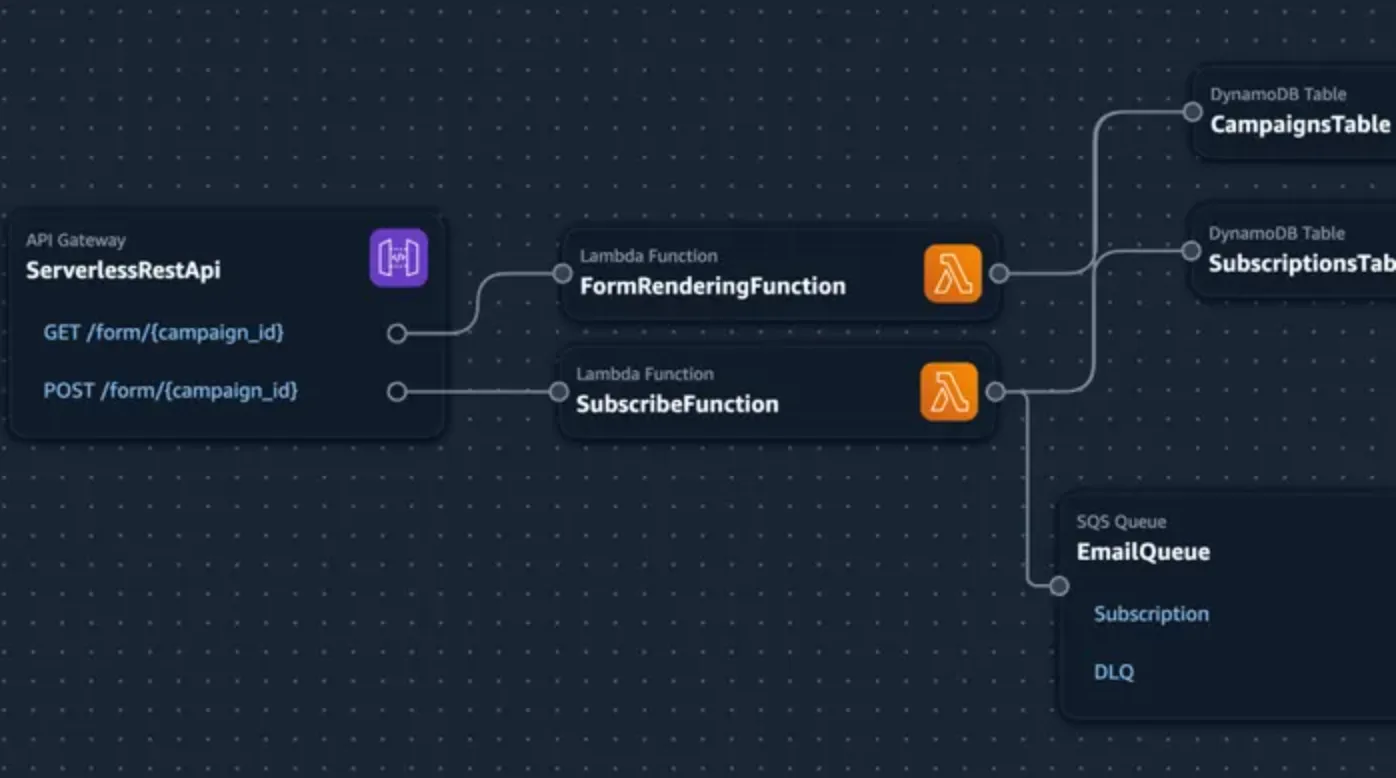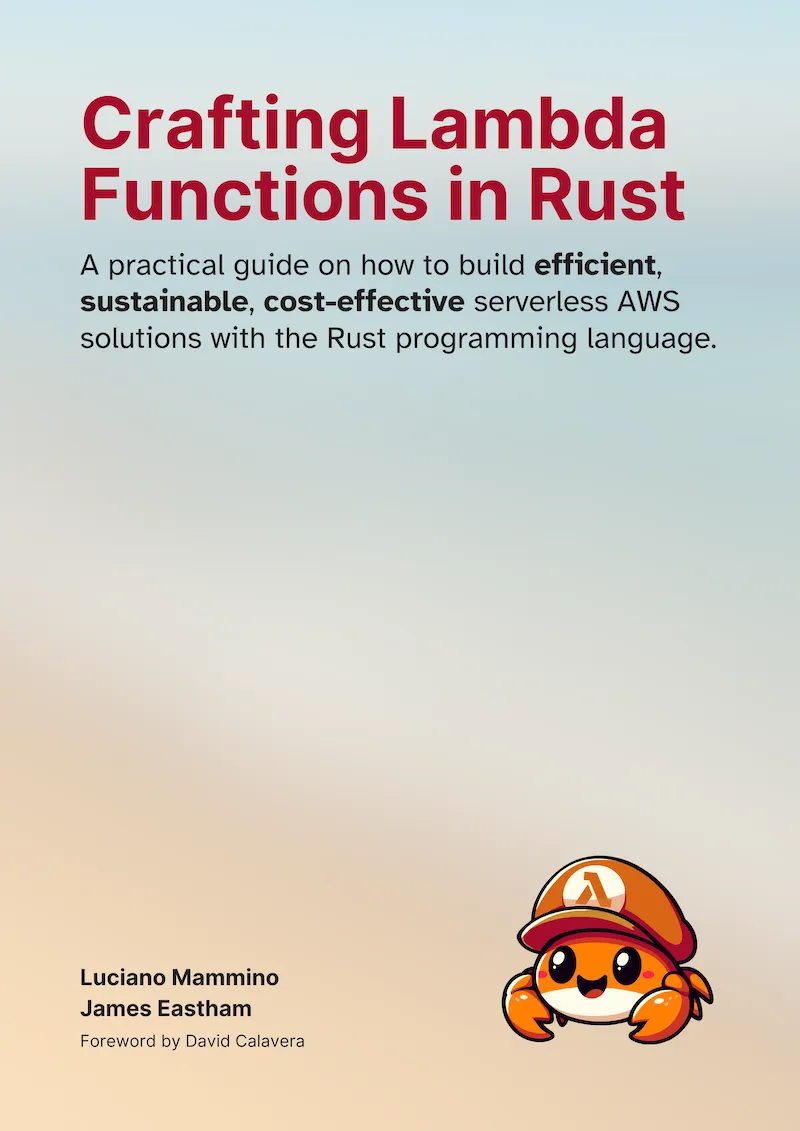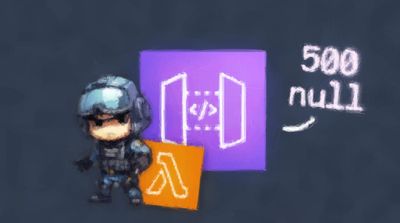I’m beyond excited to share some big news with you: I’m co-authoring a new book called Crafting Lambda Functions in Rust together with the amazing James Eastham! If you’re as passionate about serverless and Rust as I am, you’ll want to check this out. We even have an official website for it, check out the book Crafting Lambda Functions in Rust.
This book is your hands-on guide to building efficient, scalable, and cost-effective serverless applications with AWS Lambda functions and using the power of the Rust programming language.
How it all started
The idea for this book didn’t happen overnight. It all began when I kept crossing paths with James at conferences over the years. Every time we met, we’d end up deep in conversation about two of our favorite topics: serverless computing and Rust.
This year, at Rust Nation in London, the stars seemed to align. We realized that we had both been toying with the idea of writing a book to share what we’d learned about building AWS Lambda functions in Rust. We talked about how Rust is not only incredibly powerful for Lambda but also surprisingly easy (perhaps unexpectedly) to get started with. Rust has a reputation of being hard to grasp, so it might come as a surprise to many to discover that building Lambda functions with this language it’s a very accessible endeavor. While we were debating different approaches we had played with and discussing the current tooling ecosystem, it became clear that a little evangelism could go a long way in bringing this tech combo to a broader audience.
At that point, joining forces felt like the most natural thing to do. We agreed to tackle this project together, and what started as an idea is now becoming a reality. And while we’re still knee-deep in writing, we hope that someday we’ll look back and say, “And the rest is history!” For now, though, there’s a huge pile of work ahead, and we’re ready to take it on.
By the way, before you move on to find out more details about our motivations and the book itself, I’d like to make it very clear that the book is already available for purchase in early access. This means that you can start reading it right now and help us shape the final version with your feedback. If you’re interested, head over to Crafting Lambda Functions in Rust’s website to grab your copy. And yes, at the time of writing it’s heavily discounted, so I’d like to think you get yourself a bit of a good deal…
Oh yeah, let me show you the book cover as well, so you can tell that this is real!
Yes, our mascot is a crab (a cRustacean, get it?) with a Lambda hat… If you have been wandering around this blog long enough you’d probably get the video game reference as well!
Why Rust and Lambda?
I have actually written an entire blog post on this last year: Why you should consider Rust for your Lambdas. But don’t worry, if you are in a rush, I’ll give you a quick summary here anyway.
The combination of Rust and AWS Lambda is a game changer. Over the past few years, I’ve been using Rust to build serverless applications, and I’ve seen firsthand how well they complement each other. Here’s why I think Rust is an awesome choice for writing Lambda functions.
- Cost Savings and Sustainability: As a compiled language, Rust produces highly efficient binaries that are compact and lightning-fast. This means your Lambda functions run quicker, consume less memory, and ultimately cost less to execute. Remember that with Lambda functions the execution cost is given by the formula
memoryCost * executionTimewherememoryCostis a price unit that depends on how much memory you allocated for the Lambda andexecutionTimeis how long that function has been executing in milliseconds. With Rust, in most circumstances, you can lower both dimensions, compared to interpreted languages such as JavaScript and Python. But it’s not just about saving money: Rust’s efficiency reduces resource usage, which translates to a lower carbon footprint. Your apps can be both cost-effective and environmentally friendly. - Reliability and Correctness: Rust’s strict compiler and type system are like having an extra pair of eyes on your code. I am a big fan of the idea of not having a
nulltype in the language and that you have to express the potential absence of data using a dedicated wrapper type: theOptiontype. The same goes for theResulttype which lets you deal with errors in a very explicit way. These features make it easier to spot edge-cases as early as possible and you have to explicitly decide how to handle them. Once you get used to these abstractions and appreciated their benefits, you’ll find yourself being much more confident that your code is correct and reliable. When you’re working in a serverless environment where reliability is often non-negotiable, this is a huge win. - Fast Starts, Smooth Runs: With Rust, you get tiny package sizes and no garbage collection. This often translates to faster cold starts. How fast you might ask… What I have seen is something on the range of 10-60 ms (depending on the amount of libraries and the amount of init work to be performed). This is in the order of 10-20x of what I have generally observed with JavaScript and Python. Now think about using Lambdas as your HTTP backend or for any other task that has a user waiting for a response. This means that, even in the occasional presence of a cold start, your users will barely notice any additional delay which translates to a more seamless experience, even during peak loads.
- A Streamlined Developer Experience: Last but definitely not least, we should talk about DX. When I first talk to people about using Rust for Lambda functions, most of them are initially skeptical. And I get it: although fast-growing, Rust is still a relatively niche language, and it’s certainly not common to see it being used with Lambda. Plus Rust has gotten a reputation of being somewhat difficult to learn, so all of this creates an expectation that, although there might be strong benefits, it must be real hard to write a Lambda in Rust and bring it all the way to production. Now, we can argue about Rust being difficult or not. I acknowledge there might be some initial challenges when you come from languages that manage memory for you, but it’s also fair to say that it isn’t that hard to start writing Rust and get productive with it. You don’t need to become an all around expert of the language to write decent code that be shipped to production. But this isn’t the only point, because the real super power for the combo Rust-Lambda is a tool called Cargo Lambda. This tool makes it super easy to scaffold a Lambda, test it locally, compile it and ship it to production. It even integrates with most of IaC tools out there such as SAM, Terraform and even CDK. This let’s you focus on writing great code while letting the tooling handle the heavy lifting. I seriously wish a tool like this existed also for Node.js and Python!
Early Access: Read and Shape the Book!
If you got this far, hopefully, you are now convinced that using Rust for your Lambda functions is not that crazy of an idea, so the next question is how do you get started?
Well, that’s why we are writing this book, so you are in the right place!
I have a bad and a good news though!
The bad news is that the book isn’t finished (unless you are reading this a bit ahead in the future). But, the good news is that everything we have produced so far is already available and there’s a significant amount of work already!
You can get your copy of the book right now in early access. This means you can get started today! By purchasing early access, you’ll:
- Receive chapters as they’re written: You’ll get new content and updates regularly.
- Contribute to the book: Share your feedback, help shape the final version, and, if you like, get your name on the book!
- Enjoy a discounted price: Early access comes at a (significantly) reduced cost from what we are expecting the final cover price to be!
This approach lets us work collaboratively with readers to ensure the book is as practical and comprehensive as possible.
Is it worth to get the book right now? I don’t know, you tell us! 😅
I’d like to think it is a good deal if you are looking to get started ASAP.
Worth mentioning that what we have published so far includes 6 chapters that will guide you from building a serious serverless application (a URL shortener service) from scratch and ship it to production. This accounts for more than 100 pages and tons of code examples and exercises.
What’s in (and what will be in) the Book?

Here’s a list of the chapters of the book, giving you a clear roadmap of what’s available and what’s coming:
- Chapter 1: Rust & Lambda (available): We’ll explore why using Rust and AWS Lambda together is a great idea. We’ll discuss the benefits of this combination compared to other alternatives.
- Chapter 2: A ‘Hello, Serverless’ API (available): You’ll learn how to write your first Rust-powered Lambda function. You’ll create a simple “Hello, Serverless” API that demonstrates the basics of AWS Lambda and Rust.
- Chapter 3: Infrastructure as Code with SAM (available): We’ll show you how to deploy and manage your Rust Lambda functions using the Serverless Application Model (SAM). You’ll learn how to create, update, and delete your functions.
- Chapter 4: Integrating with External Systems (available): We’ll teach you how to make arbitrary HTTP requests or interact with other AWS services from your Lambda functions. We’ll cover various techniques for integrating with external systems.
- Chapter 5: Code Organization (available): This chapter will focus on best practices for organizing the code for projects with multiple Lambda functions. You’ll learn how to structure your code for maintainability and readability.
- Chapter 6: Making the Code Testable (available): We’ll show you how to structure your code in a way that allows you to write good tests for your Lambda functions. You’ll learn about testing fundamentals and how they apply to Rust Lambda functions.
- Chapter 7: Handling Different Kinds of Events (in progress): In this chapter, we’ll discuss how to handle AWS-specific events, custom events, and arbitrary JSON in a strongly-typed way. You’ll learn about event handling best practices for your Rust Lambda functions.
- Chapter 8: Different Ways of Writing Lambda Handlers (in progress): We’ll explore different ways to write your Lambda function handlers. We’ll cover simple async functions, custom structs, and implementing the Tokio Tower service trait.
- Chapter 9: Configuration Management and Handling Secrets (planned): This chapter will focus on best practices for injecting configuration and secrets into your Rust Lambda functions. You’ll learn how to securely manage sensitive data in your serverless applications.
- Chapter 10: Observing All the Things (planned): We’ll show you how to make your Rust Lambda functions observable using CloudWatch or OpenTelemetry. You’ll learn about monitoring best practices and how they apply to your serverless functions.
- Chapter 11: Middlewares (planned): In this chapter, we’ll introduce the middleware pattern and show you how to handle cross-cutting concerns in an elegant and reusable way. You’ll learn about middleware best practices for your Rust Lambda functions.
- Chapter 12: Hosting Existing HTTP Services (planned): We’ll teach you how to wrap existing HTTP services in a Lambda function to make them easily available as serverless functions. You’ll learn about the benefits and trade-offs of using this approach.
- Chapter 13: Lambda Extensions (planned): We’ll dive into writing Lambda extensions using Rust.
- Chapter 14: Integrating with GitHub Actions (planned): Learn how to configure the integration between AWS and GitHub Actions to test, build, and deploy your Lambda functions in an automated fashion.
- Appendix A: IaC Alternatives (planned): Discover how to use CDK or Terraform as an alternative to SAM for managing your serverless infrastructure.
This list isn’t set in stone! If you think there’s a big topic missing or something you’d love to see covered, please let us know. We want to write the book you’d like to read about using Rust with AWS Lambda!
Ready to Start?
As we wrap up, it’s worth mentioning that this journey isn’t just about writing AWS Lambda functions in Rust, but it’s about diving deep into the serverless ecosystem. Along the way, we’ll explore DynamoDB, S3, EventBridge, and other building blocks of serverless architecture, all while building a real, production-ready application.
And of course, this journey isn’t one you have to take alone. There’s a thriving community waiting to support you, including our Discord server, where you can connect with like-minded developers, ask questions, and share your experiences. Whether you’re here for the Rust, the serverless insights, or the hands-on learning, I’m glad to have you along for the ride.
So, what are you waiting for? Dive in, experiment, and share your feedback. Together, let’s redefine what’s possible with serverless and Rust. Head over to rust-lambda.com and start your journey today.
Let’s build something amazing together!







